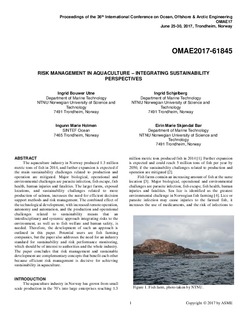Risk Management in Aquaculture: Integrating Sustainability Perspectives
Chapter
Accepted version
Permanent lenke
http://hdl.handle.net/11250/2462216Utgivelsesdato
2017-06Metadata
Vis full innførselSamlinger
- Publikasjoner fra CRIStin - SINTEF Ocean [1369]
- SINTEF Ocean [1443]
Originalversjon
ASME 2017 36th International Conference on Ocean, Offshore and Arctic Engineering; Volume 7B: Ocean Engineering 10.1115/OMAE2017-61845Sammendrag
The aquaculture industry in Norway produced 1.3 million metric tons of fish in 2014, and further expansion is expected if the main sustainability challenges related to production and operation are mitigated. Major biological, operational and environmental challenges are parasite infection, fish escape, fish health, human injuries and fatalities. The larger farms, exposed locations, and sustainability challenges related to more production of salmon increases the need for efficient decision support methods and risk management. The combined effect of the technological development, with increased remote operation, autonomy and automation, and the production and operational challenges related to sustainability means that an interdisciplinary and systemic approach integrating risks to the environment, as well as to fish welfare and human safety, is needed. Therefore, the main contents of such a risk management approach are outlined in this paper. Potential users are fish farming companies, but the paper also addresses the need for an industry standard for sustainability and risk performance monitoring, which should be of interest to authorities and the whole industry. The paper concludes that risk management and sustainable development are complementary concepts that benefit each other because efficient risk management is decisive for achieving sustainability in aquaculture.
